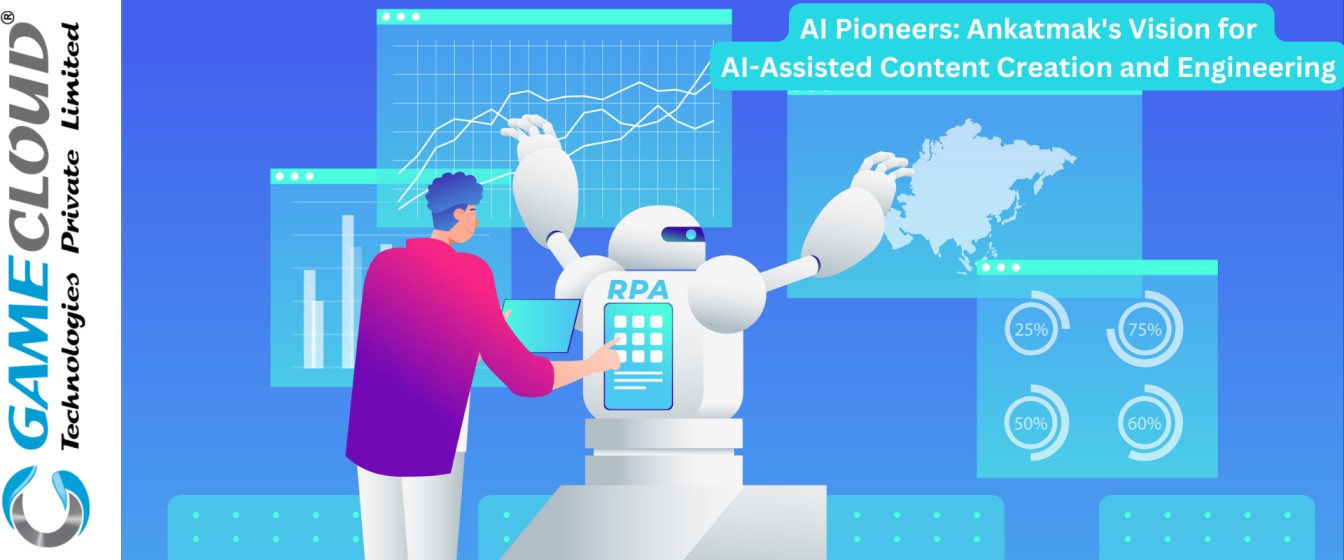
The vision for AI-assisted content creation and engineering is centred around the integration of Artificial Intelligence (AI) to enhance the quality, efficiency, and impact of digital content. AI is transforming content creation in various ways, such as automating content generation, optimising content relevance, enhancing SEO strategies, personalising content, and improving content editing.
In terms of AI-assisted content creation, algorithms and models like GPT-3, DALL-E, and Stable Diffusion are being used to enhance the editorial process. These technologies can generate and enhance textual content, provide content ideas, optimise content for SEO, and create visual content like images and videos. They can also be used to analyse user behaviour, search trends, and competitor content to identify the most relevant keywords and topics, ensuring that content aligns with the search intent of users.
AI-assisted engineering, on the other hand, is about leveraging AI to streamline and automate content creation processes. AI can analyse audience engagement, offering valuable insights that allow content creators to fine-tune their work for maximum appeal and impact. AI-driven ideas and content generators, content editors, and schedulers can complete tasks at an accelerated pace, outperforming human marketers in terms of speed and memory capacity.
In the future, we can expect to see AI-powered chatbots offering real-time customer support, voice-activated content creation, and predictive content analytics that anticipate user preferences. Businesses that embrace these AI-driven innovations will have a distinct advantage in the competitive digital landscape.
Benefits of using AI in Content Creation and Engineering
The benefits of using AI in content creation and engineering include:
- Efficiency: AI can automate repetitive tasks, streamline processes, and enable faster task completion, saving time and resources for more strategic and creative endeavours.
- Quality: AI-powered tools can analyse existing content, identify patterns, and provide suggestions for improvement, ensuring that content adheres to best practices, improves readability, and resonates with the target audience.
- Personalisation: AI allows businesses to create personalised content based on user preferences, behaviour, and demographic information, delivering a more immersive and engaging experience, driving higher engagement and conversions.
- Competitor Analysis: AI can analyse competitors’ content, trends, and strategies, enabling businesses to stay aligned with industry dynamics and maintain a competitive edge.
- Content Ideation: AI tools can contribute to the brainstorming process by automatically generating content ideas, ensuring a constant flow of fresh ideas that resonate with the target audience.
- Decision-Making and ROI: AI’s descriptive and predictive analytics empower enterprises to enhance decision-making and maximise ROI by providing critical insights into content performance, ensuring efficient resource allocation, and optimising marketing efforts.
- Improved SEO: AI can optimise content for SEO, ensuring that content is easily discoverable by search engines and reaches the right audience.
- Enhanced Creativity: AI can assist in content generation, allowing human creators to focus on more strategic and creative aspects of content creation.
- Adaptability: AI-driven content creation adapts to the changing needs of learners by using adaptive algorithms to continuously tailor content, ensuring it remains relevant and effective for learners.
- Integration: AI is likely to become more integrated into the content creation process, expanding its capabilities and providing even more efficient and personalised experiences.

How can AI be used to personalise content for different audiences?
AI can be utilised to personalise content for different audiences through a variety of innovative strategies and tools. By leveraging AI-powered personalisation, businesses can tailor content to individual preferences, behaviours, and interests, enhancing the overall customer experience. One key way AI achieves this is through segmenting and targeting with predictive analytics, where machine learning algorithms analyse vast datasets to identify micro-segments of users based on subtle patterns in behaviour. This enables the creation of hyper-targeted messages and offers, essentially providing a one-to-one personalised service on a massive scale. Companies like Reebok and Pandora have successfully employed this technology to scale personalisation to diverse customer bases.
Moreover, AI facilitates recommending more personalised content by generating precisely relevant product recommendations derived from customer data, session-based information, and shopping history. This data-driven approach informs personalised content recommendations across various channels, such as websites, emails, ads, and AI-enabled chatbots, ensuring that customers receive tailored content that aligns with their preferences and past interactions. This level of personalisation enhances engagement and drives better results in marketing efforts.
Additionally, AI improves personalising experiences across channels by enabling seamless omnichannel personalised experiences. AI-powered data integration allows for understanding and analysing previous interactions and channel engagement, leading to the delivery of contextual messaging to each customer consistently across channels. This continuity in personalised experiences is crucial for enhancing the customer experience and fostering stronger connections with the audience. By leveraging AI in this manner, businesses can ensure that their content resonates with individual users, regardless of the channel they engage with, ultimately driving customer satisfaction and loyalty.
Furthermore, AI enables hyper-personalisation at scale by customising content, products, or services to individual users based on their preferences, behaviours, and real-time data. This level of personalisation is essential for delivering the best possible customer experience, as AI can predict how customer needs and tastes will evolve, going beyond traditional methods of personalisation that rely on static perspectives of past behaviour. By utilising behavioural patterns and individual data, AI can anticipate future preferences and tailor content accordingly, ensuring that businesses stay ahead in meeting evolving customer needs and expectations.
Examples of successful ai-assisted content creation campaigns
- ClickUp: ClickUp, a project management solution, uses Surfer SEO’s natural language processing AI tools and machine learning technology to optimise content, identify opportunities for content optimization, understand which keywords to include in articles, and gain insights into the ideal article structure. This has led to an 85% upturn in organic, non-branded traffic and the completion of over 130 optimisations and publishing of more than 150 blogs.
- BuzzFeed: BuzzFeed, one of the best content websites, is making its first foray into AI-driven content using tools from OpenAI to deliver personalised content at scale. This approach enhances the quiz experience, informs brainstorming, and personalised content for their audience.
- Euroflorist: Euroflorist uses AI to drive A/B testing at scale, optimising various on-page elements, from images to menu layouts to CTA buttons. This has improved the overall user experience and contributed to higher dwell times and reduced bounce rates.
- Zoom: During the pandemic, Zoom chose Grammarly, an AI-powered writing tool, to maintain its style guide globally while reducing the time required to manually check content correctness, and engagement. This has helped Zoom save an estimated 7,000+ hours on written communication, equivalent to approximately $210,000.
- Bamboo Rose: Bamboo Rose, a product lifecycle management solution for retailers, uses AI to double its content output. The company uses Writer AI to upload videos and webinar recordings, create transcripts, organise key points, and pull out quotes to jumpstart blogs, acting as the company’s PR function by writing press releases based on a couple of facts, inputs, and quotes.

What were the goals of the successful ai-assisted content creation campaigns?
The goals of successful AI-assisted content creation campaigns include:
- Automating content generation: AI-powered content generators can produce high-quality, coherent, and contextually relevant articles, blog posts, product descriptions, and more. This not only saves time and effort but also ensures a consistent flow of fresh content, which is crucial for SEO success.
- Improving content relevance: AI-driven tools can analyse user behaviour, search trends, and competitor content to identify the most relevant keywords and topics. By optimising content around these insights, AI ensures that your content aligns with the search intent of users, boosting your chances of ranking higher and enhancing the user experience.
- Enhancing SEO strategies: AI can analyse vast datasets to identify keywords with high search volumes and low competition, enabling businesses to target niche markets effectively. AI can also track changes in search engine algorithms and adapt strategies accordingly, ensuring that your content remains visible and competitive.
- Personalising content: AI algorithms can analyse user behaviour, preferences, and demographics to deliver personalised content recommendations. By tailoring content to individual users, businesses can increase user satisfaction, engagement, and retention.
- Optimising content for social media: AI can generate data-specific content for social media posts, brief reports, news updates, and notifications for personal messaging apps. This can help businesses stay ahead in the SEO game and improve their online presence.
- Automating small content requirements: AI tools can craft personalised content with little guidance from humans, fulfilling small content requirements for businesses. This can help supercharge content creation and generate even more high-quality content.
- Providing natural language generation: AI-powered tools can create high-quality, engaging content using natural language generation (NLG). This technology is already being used by renowned media houses like The New York Times, The Washington Post, Reuters, and several others for content creation.
- Automating grammar and style checks: AI-powered grammar and style checkers can meticulously review and edit content to ensure it is free from errors and adheres to high-quality standards. This enhances the professionalism of your content and can positively impact your website’s credibility.
- Creating engaging visuals: AI isn’t limited to text-based content; it extends to visual content as well. Tools like AI-generated image and video creation can help you produce eye-catching visuals that complement your written content, contributing to higher dwell times, reduced bounce rates, and improved SEO rankings.
Statistics for AI-assisted content creation and engineering
Recent numbers on AI-assisted content creation and engineering indicate a significant shift in the way businesses and individuals approach content production and engineering tasks. Here are some key statistics and insights:
- AI Content Generation Tools: 58% of marketers aimed to use AI for SEO content generation this year, demonstrating the growing interest in AI-powered content creation tools.
- AI-Assisted Content Creation: AI-assisted content creation is transforming the writing industry, with AI tools offering invaluable support in content planning and organisation. AI technologies can automate data analysis, news aggregation, and curation, fact-checking, and even generate news stories based on raw data or predefined parameters.
- AI in Journalism: AI is revolutionising journalism, with 92% of companies using AI-driven personalisation to drive business growth. AI can process massive amounts of data in real-time, enabling journalists to identify trends, patterns, and correlations, and conduct thorough investigative reporting.

- AI in Copywriting and Marketing: AI-assisted content creation is also gaining ground in copywriting and marketing, with 52% of business leaders currently using AI content generation tools to assist their content marketing efforts. AI can provide content suggestions based on data analysis, user preferences, and specific writing requirements, helping writers generate ideas, outlines, and relevant information.
- AI in Engineering: By 2025, 95% of customer interactions will be powered by AI, and AI will be used to develop new technologies for reducing pollution and protecting the environment. AI is also being used in manufacturing to automate tasks, optimise production, and improve quality control.
Ankatmak Pioneering the Vision
Ankatmak, a sub-brand of GameCloud Technologies Pvt Ltd, is a pioneer in the field of AI-assisted content creation and engineering. With a focus on AI outsourcing, prompt engineering, and IT consultancy, Ankatmak offers diverse engineering skills, AI-assisted content creation, and custom AI solutions like chatbots and educational & training modules.
Ankatmak’s expertise in AI-assisted content creation is evident in their services, which include software and mobile app development, website development, custom software solutions, IT consulting, cloud services, software testing and quality assurance, consulting of AI & ChatBots, data analytics and business intelligence, IT support, e-commerce solutions, digital marketing, training and education, and prompt engineers.
The company’s commitment to innovation and excellence is reflected in their diverse range of services, which cater to various technical domains and industries. Ankatmak’s AI-assisted content creation capabilities are particularly noteworthy, as they enable the generation of high-quality, coherent, and contextually relevant articles, blog posts, product descriptions, and more.
Ankatmak’s services are designed to navigate clients through the complexities of the digital landscape, ensuring tailored, cutting-edge AI and IT consultancy. The company’s team of 70+ dedicated professionals is equipped with skills in research, design, and development, and they work as the backend team of GameCloud Technologies Pvt Ltd.
Ankatmak’s vision aligns with the current and future trends in the custom software industry, as it uses AI and prompt engineering to create custom software solutions that are in high demand and offer high value. The company’s approach to custom software development reduces the cost and time of development, increases the quality and efficiency of solutions, and enhances the innovation and creativity of the software.
Conclusion
In conclusion, the vision for AI-assisted content creation and engineering is about harnessing the power of AI to automate, optimise, and enhance content creation processes, leading to improved competitor analysis, better decision-making, faster task completion, and ultimately, better content that resonates with the target audience.
